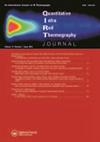用于主动热成像无人机平台的热激发源的研制
IF 4.9
3区 工程技术
Q1 INSTRUMENTS & INSTRUMENTATION
引用次数: 12
摘要
本工作旨在解决在无人机(UAV)平台上使用主动红外热像仪(IRT)的有效性和挑战。这项工作旨在评估小型低功率激励形式的性能,这些激励形式适用于主动热成像和定位复合材料表面下缺陷的能力。多个250瓦灯的激励源安装在无人机上,完全由电池供电,并配有远程触发器来循环供电。多个实验处理来自无人机的干扰,同时执行主动红外热成像检查。计算了利用IRT进行无人机检测所需的最佳距离和时间。采用多种信号处理技术对复合材料进行分析,有助于定位亚表面缺陷。据观察,一架无人机可以成功地携带所需的传感器和设备进行主动热成像无损检测,可以提供进入困难区域的通道。大多数主动热成像检测设备体积大、重量重、价格昂贵。此外,使用这种设备对复杂结构进行检测非常耗时。例如,一名樱桃采摘员将被要求检查飞机的尾部。该解决方案旨在帮助工程师检查复杂的复合材料结构,并可能显著减少常规检查的时间和成本。本文章由计算机程序翻译,如有差异,请以英文原文为准。
Development of a thermal excitation source used in an active thermographic UAV platform
ABSTRACT This work aims to address the effectiveness and challenges of using active infrared thermography (IRT) onboard an unmanned aerial vehicle (UAV) platform. The work seeks to assess the performance of small low-powered forms of excitation which are suitable for active thermography and the ability to locate subsurface defects on composites. An excitation source in multiple 250 W lamps is mounted onto a UAV and is solely battery powered with a remote trigger to power cycle them. Multiple experiments address the interference from the UAV whilst performing an active IRT inspection. The optimal distances and time required for a UAV inspection using IRT are calculated. Multiple signal processing techniques are used to analyse the composites which help locate the sub-surface defects. It was observed that a UAV can successfully carry the required sensors and equipment for an Active thermographic NDT inspection which can provide access to difficult areas. Most active thermographic inspection equipment is large, heavy, and expensive. Furthermore, using such equipment for the inspection of complex structures is time-consuming. For example, a cherry picker would be required to inspect the tail of an aircraft. This solution looks to assist engineers in inspecting complex composite structures and could potentially significantly reduce the time and cost of a routine inspection.
求助全文
通过发布文献求助,成功后即可免费获取论文全文。
去求助
来源期刊

Quantitative Infrared Thermography Journal
Physics and Astronomy-Instrumentation
CiteScore
6.80
自引率
12.00%
发文量
17
审稿时长
>12 weeks
期刊介绍:
The Quantitative InfraRed Thermography Journal (QIRT) provides a forum for industry and academia to discuss the latest developments of instrumentation, theoretical and experimental practices, data reduction, and image processing related to infrared thermography.
 求助内容:
求助内容: 应助结果提醒方式:
应助结果提醒方式:


